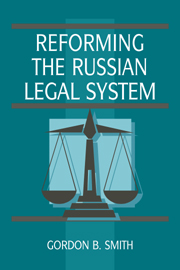Book contents
- Frontmatter
- Contents
- Preface
- 1 Pre-revolutionary Russian law
- 2 The Bolshevik experience
- 3 The history of legal reform
- 4 Forging a new constitution
- 5 Citizens and the state: the debate over the Procuracy
- 6 In search of a just system: the courts and judicial reform
- 7 Law and the transition to a market economy
- 8 Legal reform in the republics
- 9 Legal reform and the transition to democracy in Russia
- Appendix: Constitution of the Russian Federation
- Notes
- Index
3 - The history of legal reform
Published online by Cambridge University Press: 09 October 2009
- Frontmatter
- Contents
- Preface
- 1 Pre-revolutionary Russian law
- 2 The Bolshevik experience
- 3 The history of legal reform
- 4 Forging a new constitution
- 5 Citizens and the state: the debate over the Procuracy
- 6 In search of a just system: the courts and judicial reform
- 7 Law and the transition to a market economy
- 8 Legal reform in the republics
- 9 Legal reform and the transition to democracy in Russia
- Appendix: Constitution of the Russian Federation
- Notes
- Index
Summary
A law-governed state not only required observance of justice and human rights, it represented a knife in the very heart of the system.
Anatoly Sobchak Mayor, St. Petersburg (1992)Change was imminent after Stalin's death in 1953. Having endured constant and pervasive fear for more than two decades, the Soviet people were ready for a respite from dictatorial coercion. Stalin's successors moved quickly to destroy the most coercive aspects of Stalin's “prerogative state” and to rebuild party and state organs, including legal institutions. Even before the leadership succession was resolved following Stalin's death, the outlines of the legal reform began to emerge. Over the next decade, legal reform would emphasize four main themes: reducing the repressiveness of Soviet law, restoring judicial due process, redefining the relationship of citizens and the state, and popularizing the administration of justice. The first three directions of legal reform soon came to be identified with the concept of “socialist legality,” while the latter represented a return to the Marxian notion of the withering away of formal legal institutions.
While the elimination of the worst abuses of the prerogative state was achieved rather swiftly after Stalin's death, the process of expanding the “normative state” – the concepts of rule of law, citizens' rights vis-à-vis the state, judicial independence, and equality before the law – has taken much longer.
- Type
- Chapter
- Information
- Reforming the Russian Legal System , pp. 53 - 78Publisher: Cambridge University PressPrint publication year: 1996



